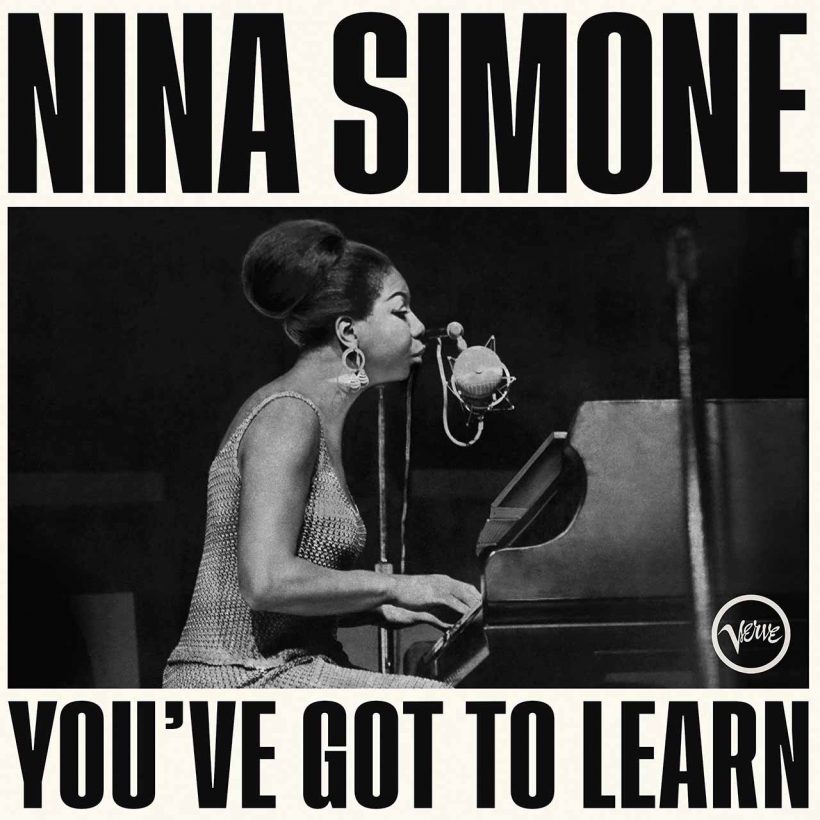Nina Simone and ‘Mississippi Goddam’ at Newport Festival
An excerpt from the liner notes to ‘You’ve Got To Learn,’ a newly-discovered recording of Nina Simone at the 1966 Newport Jazz Festival.

As part of the celebrated release You’ve Got To Learn, a newly-discovered recording of Nina Simone’s stunning performance at the 1966 Newport Jazz Festival, Shana L. Redmond penned an essay for the liner notes. Redmond is a scholar and author of Anthem: Social Movements and the Sound of Solidarity in the African Diaspora and Everything Man: The Form and Function of Paul Robeson, and she offers a lyrical description of what happened when Simone took the stage in 1966. uDiscover is proud to present this excerpt from the essay.
Described in the press as a “jazz aficionado’s fantasy dinner party,” the line-up for the inaugural Atlanta Jazz Festival included luminaries like Louis Armstrong, Miles Davis, and Thelonious Monk. Presented in 1966 by Newport Jazz Festival founder George Wein and Atlanta Stadium Productions, Inc., the concert was held at the new Atlanta Braves baseball stadium, which required an entrance unlike any other for the event’s musicians. Emerging from the dugout for her performance on that May night was a different kind of slugger, this one all fingers and lungs: Nina Simone. Leonard Feather, a witness to this “auspicious way to start a jazz program” and the emcee at the July 1966 Newport Jazz Festival, introduced Simone on Saturday evening by saying that at the close of her set in Atlanta, the intermission lights went up and revealed an audience of 15-18,000 people who “stood up and just kind of let go in grace and thanksgiving for what she had been doing.”
Listeners to You’ve Got To Learn will hear more of the same from that night’s audience in Rhode Island. There was no dugout from which Simone would appear and yet, her ability to make an entrance is undisputed. Already a household name spoken boldly with admiration or contempt, she had, in the eight years since her first hit single “I Loves You Porgy,” made a profound mark for herself as an alluring musician with a sharp political tongue. Indeed, in the month between the Atlanta and Newport festivals she, along with Sammy Davis, Jr. and James Brown, was a headliner at the “Stars Salute the Mississippi March” in Jackson, which honored participants of the three-week Meredith March Against Fear. With her steadfast support of on-the-ground civil rights activity, her well-established track record of transformative song covers, and blistering real-time creations, she made a career of dynamic here-ness/hear-ness and knew well the terrain of and audience for her song.
Newport 1966 was yet another invention. One might be surprised to hear this set, with these songs mere days after celebrating a 220-mile protest march. Her performance is not fiery so much as passionate, not critical so much as coaxing, but is, nonetheless, a perfect companion to the moment of grievance and strategy that preceded it. These are love songs and each captured something of the careful combination of intimacy and immediacy on stage for which Simone was known.
She’d already created one of the century’s most explosive songs of social critique two years before Newport: “Mississippi Goddam.” Written in response to the 1963 Alabama church bombing that killed four little girls and the assassination of Medgar Evers in Mississippi that same year, the song was described by Simone as a show tune without a show. The Newport performance, however, abandons the oompah rhythm and levity of the known piano accompaniment in service of a deep groove that is so different from the original that the audience doesn’t recognize the selection until she sings the first line (“Alabama’s got me so upset”). Their muffled laughter and applause exposed how distinct this version was from the song that the South tried to censor. Simone swings, sending the listener on a wave across the growing expanse of national violence with her inclusion of “Watts has made me lose my rest.” Missing the rage – though none of the hurt, fatigue, or indictment – that prompted the original and with a delivery like a seductive caress, “Mississippi Goddam” was a love song on that Newport stage that may only have been possible on the heels of a restorative trip to Jackson with comrades in art. A love song for those lost and those fighting, the song, which was meant as the closer for her set, instead was another entrance for this shapeshifting genius of ivory and air.
After she first puzzles and then transfixes her audience with that night’s “Mississippi Goddam,” Simone takes leave. It’s a proper close even as we know that the audience won’t let her go so easily. After struggling with the demanding audience, the announcer receives a “special message”: there will be one more selection, an encore by her alone. Simone creates a hush over everyone, either through her admonishment to “shut up, shut up” or her lithe transition into singing, “There is music for lovers…” This sequence is perfectly her: defensive gestures insistent upon respect that melt into the fullness of her singular voice. She ends, finally, where she began, singing of love’s resonant possibility. This reminder is how to survive love’s breaking, an experience that she knew all too well.













Hilda Fernhout
July 22, 2023 at 5:26 pm
In 1965 Nina Simone gave a concert for Dutch television
I was in the audience
The song ” Mississippi Goddam” was cut from the broadcast
Profanity was the reason they gave
It is on the dvd though